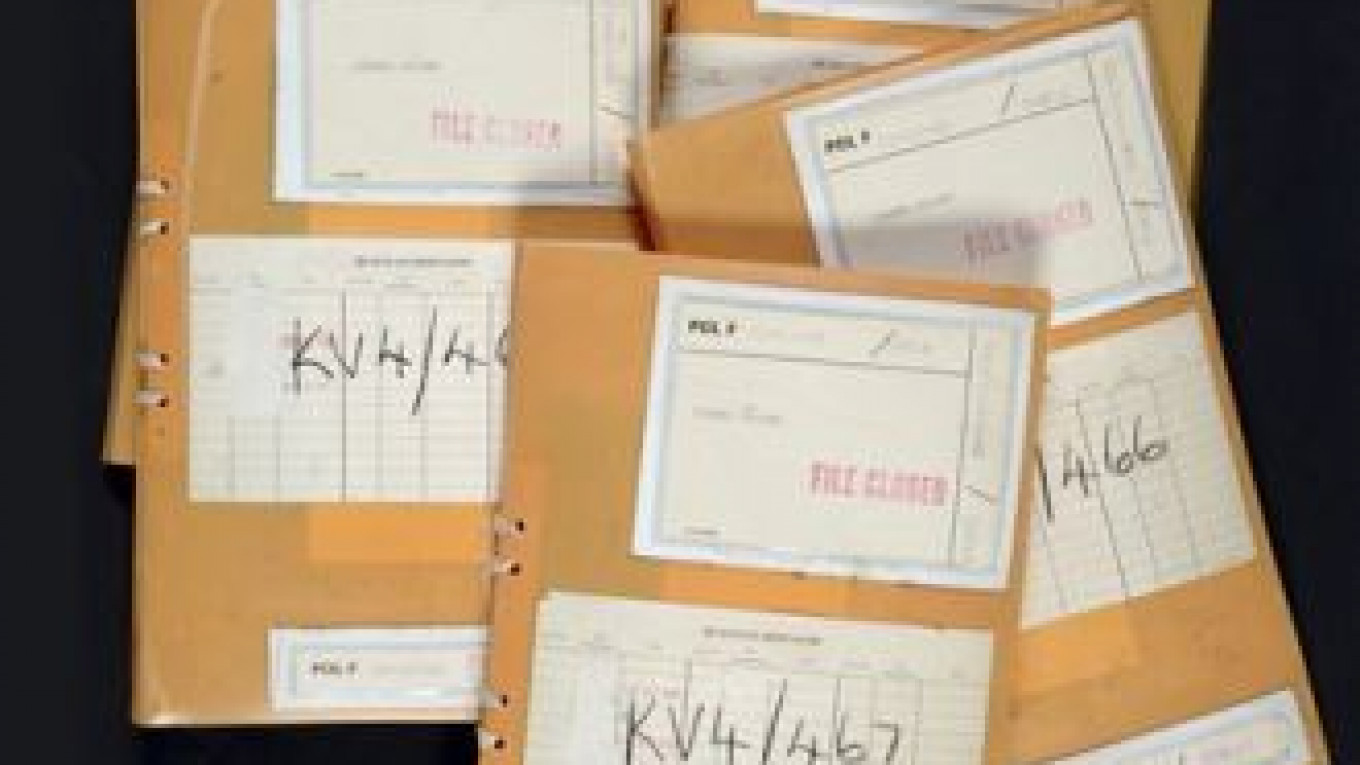LONDON — Cold War spy Klaus Fuchs was told to throw a magazine into a London garden to set up a rendezvous with his Russian contact, a slice of everyday espionage life revealed in diaries by one of Britain's top intelligence officers.
Fuchs, a nuclear physicist who was one of the Soviet Union's most valuable spies before being jailed in 1950, had to mark Page 10 of the magazine to show he wanted to meet his contact, who would answer with a chalk mark on a local lamp post.
The 10 diaries by Guy Liddell, at the time deputy director-general of the MI5 domestic spy agency, offer an insider's perspective at the dawning of a political system that would dominate the world for decades to come.
Liddell tirelessly documented his dealings between 1945 and 1953 with the British government and other intelligence officials, including the government of Clement Attlee, and the "Cambridge Five," now-notorious double agents whom Liddell mentions with affection.
Experts say the new diaries, which pick up where Liddell's previously released World War II diaries left off, contribute to the understanding of the period because they come from an authoritative source with a sharp mind and high-level access to classified information.
"We're getting a picture of what was going on at the center of the intelligence world, very much as it happened, from a person at the top, writing with complete candor, and someone who knew a lot of the individuals involved," said Andrew Lownie, a journalist and author on the intelligence world. "We've got the whole beginning of the Cold War."
The bizarre dealings of intelligence agencies led Liddell to tell stories of Charlie Chaplin, "flying saucers" and a "luminous man" who "shines in the dark" after his exposure to plutonium at a nuclear facility. Liddell stayed up late into the night dictating the stories to his secretary.
The diaries also offer details of what was happening inside the intelligence agencies when Donald Maclean and Guy Burgess, two of the "Cambridge Five" double-agents who passed secrets to Moscow, fled Britain.
"It seems pretty clear that the pair of them have gone off," Liddell writes wryly in May 1951.
A few weeks later, he is still grappling with the new reality: "It seemed to me unlikely that a man of Burgess's intelligence could imagine that he had any future in Russia."
In one previously unknown case, another "Cambridge Five" agent, Kim Philby, who in 1950 was stationed in Washington for MI6 while also passing information to the Soviet Union, sought to persuade Liddell to appoint him MI5 representative as well.
"I certainly gave him no encouragement," Liddell wrote.
Liddell described how the discovery that the Russians had tested the atomic bomb in 1949 was announced to the Joint Intelligence Committee by Foreign Office chairman William Hayter, under a "melodramatic bond of secrecy."
"Hayter cleared the room of secretaries and then said that if there was anybody present who could not keep what was going to be said to himself, would he kindly leave the room," he records in September 1949.
The discovery had "thrown everyone's calculations out of date," he wrote on New Year's Day in 1950, saying it was unclear whether this was still an experimental bomb.
"It is, however, clear that by 1957 at any rate the Russians should have sufficient atomic bombs to blot this country out entirely," he said.
Some experts believe that the Russians were able to develop atomic weapons at least one year ahead of schedule because of the information passed to them by British-based physicist Fuchs.
The Fuchs scandal strained relations with the United States, furious that the leakage had taken place.
In 1950, an exasperated Liddell wrote that the Americans "are utterly incapable … of seeing anybody's point of view except their own. And that they are quite ready to cut off their noses to spite their faces!"
Liddell, who experts say would have been astonished to know the diaries he dictated every night to his secretary were published, also makes personal observations on world events such as the assassination of Gandhi.
Winston Churchill, Josef Stalin and West German leader Konrad Adenauer also lurk in the background of his writing.
He held especially frequent meetings with Prime Minister Attlee, showing how the government was preoccupied with the risk of links between Attlee's Labour Party and Communists, said Christopher Andrew, a professor of modern and contemporary history at Cambridge and official historian of MI5.
Related articles:
A Message from The Moscow Times:
Dear readers,
We are facing unprecedented challenges. Russia's Prosecutor General's Office has designated The Moscow Times as an "undesirable" organization, criminalizing our work and putting our staff at risk of prosecution. This follows our earlier unjust labeling as a "foreign agent."
These actions are direct attempts to silence independent journalism in Russia. The authorities claim our work "discredits the decisions of the Russian leadership." We see things differently: we strive to provide accurate, unbiased reporting on Russia.
We, the journalists of The Moscow Times, refuse to be silenced. But to continue our work, we need your help.
Your support, no matter how small, makes a world of difference. If you can, please support us monthly starting from just $2. It's quick to set up, and every contribution makes a significant impact.
By supporting The Moscow Times, you're defending open, independent journalism in the face of repression. Thank you for standing with us.
Remind me later.






